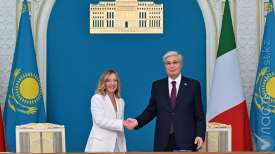Especially since the COVID-19 pandemic, mobile transfers and cashless transactions boomed in Kazakhstan. Now, the ministry of finance said its newest plans are poised to "shrink the shadow economy to 5% by 2025 from the current 6.7%", although these restrictions could lead to the opposite effect.
In 2022, the ministry rolled out a plan to keep mobile transfers under check, starting from civil servants and employees of government-affiliated enterprises and institutions. In the next two years, the monitoring of mobile transactions should have been extended to businesses and regular citizens. However, last spring the ministry showed that it does not have enough capacity to carry out this massive work.
Last month, government media said that mobile transfers could come to an end, referring to the March 2022 plan. Then, the State Revenue Committee threatened to levy fines against businesses that carry out transactions without a cash register, a POS terminal or a QR code. Yerulan Zhamaubayev, the minister of finance, however, said the law enforcement would not “harass” companies until 2025.
Despite the minister’s words, a shift seems to have already happened. Individual entrepreneurs are increasingly refusing mobile transfers, asking for cash instead. A vendor at a market in Almaty recently told me: “It’s over for Kaspi”.
Kaspi is one of the country’s most used banking app for mobile transfers and entrepreneurs fear its use could draw them into the orbit of tax prosecution.
For now, a state initiative of civilian control (“Public Control - Ask for the Receipt”) is the only measure against small-scale tax evasion. Should a more widespread monitoring kick off, businesses would feel the pressure. Given the lack of state capacity, the government media publications about this look like a manipulation to instill fear.
Mobile transactions have grown steadily. In the first half of 2023, the volume of cashless transactions amounted to 63.1 trillion tenge ($139 billion), a 44% growth compared to the previous year.
It is important for the government to fight the shadow economy. But so far the ministry of finance has implemented measures and campaigns that will likely increase cash operations and push businesses further into the shadows.
Поддержите журналистику, которой доверяют.








